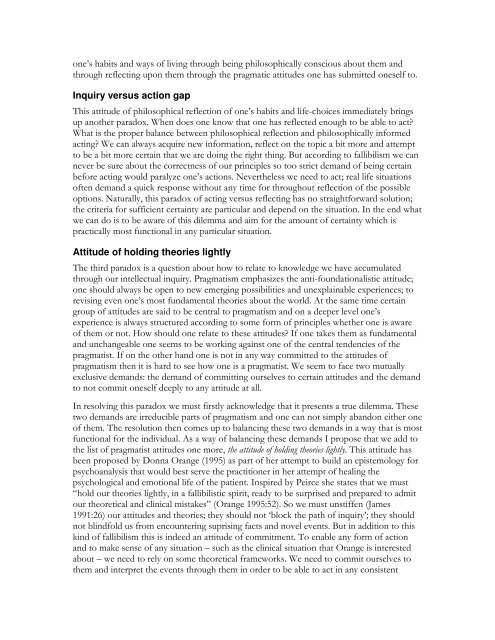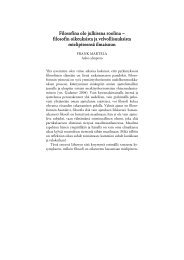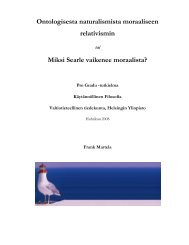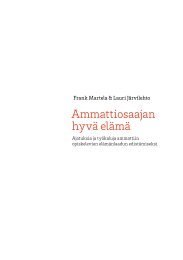Pragmatism as an attitude - Frank Martela
Pragmatism as an attitude - Frank Martela
Pragmatism as an attitude - Frank Martela
Create successful ePaper yourself
Turn your PDF publications into a flip-book with our unique Google optimized e-Paper software.
one’s habits <strong>an</strong>d ways of living through being philosophically conscious about them <strong>an</strong>d<br />
through reflecting upon them through the pragmatic <strong>attitude</strong>s one h<strong>as</strong> submitted oneself to.<br />
Inquiry versus action gap<br />
This <strong>attitude</strong> of philosophical reflection of one’s habits <strong>an</strong>d life-choices immediately brings<br />
up <strong>an</strong>other paradox. When does one know that one h<strong>as</strong> reflected enough to be able to act?<br />
What is the proper bal<strong>an</strong>ce between philosophical reflection <strong>an</strong>d philosophically informed<br />
acting? We c<strong>an</strong> always acquire new information, reflect on the topic a bit more <strong>an</strong>d attempt<br />
to be a bit more certain that we are doing the right thing. But according to fallibilism we c<strong>an</strong><br />
never be sure about the correctness of our principles so too strict dem<strong>an</strong>d of being certain<br />
before acting would paralyze one’s actions. Nevertheless we need to act; real life situations<br />
often dem<strong>an</strong>d a quick response without <strong>an</strong>y time for throughout reflection of the possible<br />
options. Naturally, this paradox of acting versus reflecting h<strong>as</strong> no straightforward solution;<br />
the criteria for sufficient certainty are particular <strong>an</strong>d depend on the situation. In the end what<br />
we c<strong>an</strong> do is to be aware of this dilemma <strong>an</strong>d aim for the amount of certainty which is<br />
practically most functional in <strong>an</strong>y particular situation.<br />
Attitude of holding theories lightly<br />
The third paradox is a question about how to relate to knowledge we have accumulated<br />
through our intellectual inquiry. <strong>Pragmatism</strong> emph<strong>as</strong>izes the <strong>an</strong>ti-foundationalistic <strong>attitude</strong>;<br />
one should always be open to new emerging possibilities <strong>an</strong>d unexplainable experiences; to<br />
revising even one’s most fundamental theories about the world. At the same time certain<br />
group of <strong>attitude</strong>s are said to be central to pragmatism <strong>an</strong>d on a deeper level one’s<br />
experience is always structured according to some form of principles whether one is aware<br />
of them or not. How should one relate to these <strong>attitude</strong>s? If one takes them <strong>as</strong> fundamental<br />
<strong>an</strong>d unch<strong>an</strong>geable one seems to be working against one of the central tendencies of the<br />
pragmatist. If on the other h<strong>an</strong>d one is not in <strong>an</strong>y way committed to the <strong>attitude</strong>s of<br />
pragmatism then it is hard to see how one is a pragmatist. We seem to face two mutually<br />
exclusive dem<strong>an</strong>ds: the dem<strong>an</strong>d of committing ourselves to certain <strong>attitude</strong>s <strong>an</strong>d the dem<strong>an</strong>d<br />
to not commit oneself deeply to <strong>an</strong>y <strong>attitude</strong> at all.<br />
In resolving this paradox we must firstly acknowledge that it presents a true dilemma. These<br />
two dem<strong>an</strong>ds are irreducible parts of pragmatism <strong>an</strong>d one c<strong>an</strong> not simply ab<strong>an</strong>don either one<br />
of them. The resolution then comes up to bal<strong>an</strong>cing these two dem<strong>an</strong>ds in a way that is most<br />
functional for the individual. As a way of bal<strong>an</strong>cing these dem<strong>an</strong>ds I propose that we add to<br />
the list of pragmatist <strong>attitude</strong>s one more, the <strong>attitude</strong> of holding theories lightly. This <strong>attitude</strong> h<strong>as</strong><br />
been proposed by Donna Or<strong>an</strong>ge (1995) <strong>as</strong> part of her attempt to build <strong>an</strong> epistemology for<br />
psycho<strong>an</strong>alysis that would best serve the practitioner in her attempt of healing the<br />
psychological <strong>an</strong>d emotional life of the patient. Inspired by Peirce she states that we must<br />
“hold our theories lightly, in a fallibilistic spirit, ready to be surprised <strong>an</strong>d prepared to admit<br />
our theoretical <strong>an</strong>d clinical mistakes” (Or<strong>an</strong>ge 1995:52). So we must unstiffen (James<br />
1991:26) our <strong>attitude</strong>s <strong>an</strong>d theories; they should not ‘block the path of inquiry’; they should<br />
not blindfold us from encountering suprising facts <strong>an</strong>d novel events. But in addition to this<br />
kind of fallibilism this is indeed <strong>an</strong> <strong>attitude</strong> of commitment. To enable <strong>an</strong>y form of action<br />
<strong>an</strong>d to make sense of <strong>an</strong>y situation – such <strong>as</strong> the clinical situation that Or<strong>an</strong>ge is interested<br />
about – we need to rely on some theoretical frameworks. We need to commit ourselves to<br />
them <strong>an</strong>d interpret the events through them in order to be able to act in <strong>an</strong>y consistent






